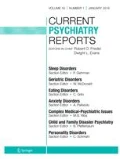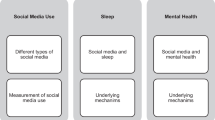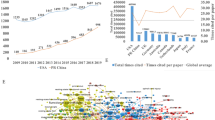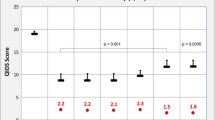Abstract
Historically, insomnia has been viewed as a symptom of depressive illness that is expected to resolve with adequate treatment of the depressive disorder. This article reviews the evidence that increasingly challenges this simplistic view and summarizes research demonstrating the multifaceted interplay between insomnia and depression. It discusses the prevalence, clinical significance, and time course of insomnia, distinguishing between poor sleep and an insomnia disorder. The article also discusses abnormalities in sleep architecture in major depressive disorder and theories about the pathways connecting sleep and depression. It concludes with a discussion of issues related to treatment, including the effects of antidepressants on sleep and new evidence of the utility of adding an insomnia-specific therapy for improved management of depressed patients with comorbid insomnia.
Similar content being viewed by others
References and Recommended Reading
Pigeon WR, Perlis M: Insomnia and depression: “birds of a feather?” Int J Sleep Disord 2007, 3:82–91.
Edinger JD, Bonnet MH, Bootzin RR, et al.: Derivation of research diagnostic criteria for insomnia: report of an American Academy of Sleep Medicine Work Group. Sleep 2004, 27:1567–1596.
Ohayon MM: Prevalence of DSM-IV diagnostic criteria of insomnia: distinguishing insomnia related to mental disorders from sleep disorders. J Psychiatr Res 1997, 31:333–346.
Ohayon MM, Roth T: Place of chronic insomnia in the course of depressive and anxiety disorders. J Psychiatr Res 2003, 37:9–15.
Ohayon MM, Roberts RE, Zulley J, et al.: Prevalence and patterns of problematic sleep among older adolescents. J Am Acad Child Adolesc Psychiatry 2000, 39:1549–1556.
Carney CE, Edinger JD, Manber R, et al.: Beliefs about sleep in disorders characterized by sleep and mood disturbance. J Psychosom Res 2007, 62:179–188.
Kohn L, Espie CA: Sensitivity and specificity of measures of the insomnia experience: a comparative study of psychophysiologic insomnia, insomnia associated with mental disorder and good sleepers. Sleep 2005, 28:104–112.
Perlis ML, Giles DE, Buysse DJ, et al.: Which depressive symptoms are related to which sleep electroencephalographic variables? Biol Psychiatry 1997, 42:904–913.
Adrien J: Neurobiological bases for the relation between sleep and depression. Sleep Med Rev 2002, 6:341–351.
Nofzinger EA, Thase ME, Reynolds CF 3rd, et al.: Hypersomnia in bipolar depression: a comparison with narcolepsy using the multiple sleep latency test. Am J Psychiatry 1991, 148:1177–1181.
Kayumov L, Rotenberg V, Buttoo K, et al.: Interrelationships between nocturnal sleep, daytime alertness, and sleepiness: two types of alertness proposed. J Neuropsychiatry Clin Neurosci 2000, 12:86–90.
McCall WV, Reboussin BA, Cohen W: Subjective measurement of insomnia and quality of life in depressed inpatients. J Sleep Res 2000, 9:43–48.
Chellappa SL, Araujo JF: Sleep disorders and suicidal ideation in patients with depressive disorder. Psychiatry Res 2007, 153:131–136.
Cukrowicz K, Otamendi A, Pinto J, et al.: The impact of insomnia and sleep disturbances on depression and suicidality. Dreaming 2006, 16:1–10.
Walker MP: The role of sleep in cognition and emotion. Ann N Y Acad Sci 2009, 1156:168–197.
Nofzinger EA, Schwartz SM, Reynolds CF, et al.: Affect intensity and phasic REM sleep in depressed men before and after treatment with cognitive-behavioral therapy. J Consult Clin Psychol 1994, 62:83–91.
Sbarra DA, Allen JJ: Decomposing depression: on the prospective and reciprocal dynamics of mood and sleep disturbances. J Abnorm Psychol 2009, 118:171–182.
Dew MA, Reynolds CF 3rd, Houck PR, et al.: Temporal profiles of the course of depression during treatment. Predictors of pathways toward recovery in the elderly. Arch Gen Psychiatry 1997, 54:1016–1024.
Thase ME, Simons AD, Reynolds CF 3rd: Abnormal electroencephalographic sleep profiles in major depression: association with response to cognitive behavior therapy. Arch Gen Psychiatry 1996, 53:99–108.
Pigeon WR, Hegel M, Unutzer J, et al.: Is insomnia a perpetuating factor for late-life depression in the IMPACT cohort? Sleep 2008, 31:481–488.
Trivedi MH, Hollander E, Nutt D, Blier P: Clinical evidence and potential neurobiological underpinnings of unresolved symptoms of depression. J Clin Psychiatry 2008, 69:246–258.
Nierenberg AA, Keefe BR, Leslie VC, et al.: Residual symptoms in depressed patients who respond acutely to fluoxetine. J Clin Psychiatry 1999, 60:221–225.
Carney CE, Segal ZV, Edinger JD, Krystal AD: A comparison of rates of residual insomnia symptoms following pharmacotherapy or cognitive-behavioral therapy for major depressive disorder. J Clin Psychiatry 2007, 68:254–260.
Dombrovski AY, Cyranowski JM, Mulsant BH, et al.: Which symptoms predict recurrence of depression in women treated with maintenance interpersonal psychotherapy? Depress Anxiety 2008, 25:1060–1066.
Chambers AS, Manber R, Siebern AT, Tikotzky L: Persistent sleep disturbance during pregnancy predicts reemergence of a core symptom of depression in the postpartum [abstract]. Sleep 2009, 32:A355.
Dombrovski AY, Mulsant BH, Houck PR, et al.: Residual symptoms and recurrence during maintenance treatment of late-life depression. J Affect Disord 2007, 103:77–82.
Krystal AD, Thakur M, Roth T: Sleep disturbance in psychiatric disorders: effects on function and quality of life in mood disorders, alcoholism, and schizophrenia. Ann Clin Psychiatry 2008, 20:39–46.
Armitage R: Sleep and circadian rhythms in mood disorders. Acta Psychiatr Scand Suppl 2007, 433:104–115.
Riemann D, Berger M, Voderholzer U: Sleep and depression-results from psychobiological studies: an overview. Biol Psychol 2001, 57:67–103.
Johnson EO: Epidemiology of insomnia: from adolescence to old age. Sleep Med Clin 2006, 1:305–317.
Jansson-Frojmark M, Lindblom K: A bidirectional relationship between anxiety and depression, and insomnia? A prospective study in the general population. J Psychosom Res 2008, 64:443–449.
Riemann D, Voderholzer U: Primary insomnia: a risk factor to develop depression? J Affect Disord 2003, 76:255–259.
Weissman MM, Greenwald S, Nino-Murcia G, Dement WC: The morbidity of insomnia uncomplicated by psychiatric disorders. Gen Hosp Psychiatry 1997, 19:245–250.
Johnson EO, Roth T, Breslau N: The association of insomnia with anxiety disorders and depression: exploration of the direction of risk. J Psychiatr Res 2006, 40:700–708.
Perlis ML, Smith LJ, Lyness JM, et al.: Insomnia as a risk factor for onset of depression in the elderly. Behav Sleep Med 2006, 4:104–113.
Okun ML, Hanusa BH, Hall M, Wisner KL: Sleep complaints in late pregnancy and the recurrence of postpartum depression. Behav Sleep Med 2009, 7:106–117.
Perlis ML, Giles DE, Buysee DJ, et al.: Self-reported sleep disturbance as a prodromal symptom in recurrent depression. J Affect Disord 1997, 42:209–212.
Chang PP, Ford DE, Mead LA, et al.: Insomnia in young men and subsequent depression. The Johns Hopkins Precursors Study. Am J Epidemiol 1997, 146:105–114.
Haynes P, McQuaid J, Ancoli-Israel S, Martin J: Disrupting life events and the sleep-wake cycle in depression. Psychol Med 2006, 36:1363–1373.
Walker MP: Sleep refreshes human emotional brain reactivity [abstract]. Sleep 2009, 32:A126.
Gregory AM, Rijsdijk FV, Lau JY, et al.: The direction of longitudinal associations between sleep problems and depression symptoms: a study of twins aged 8 and 10 years. Sleep 2009, 32:189–199.
Peterson MJ, Benca RM: Sleep in mood disorders. Psychiatr Clin North Am 2006, 29:1009–1032; abstract ix.
Thase ME, Haight BR, Richard N, et al.: Remission rates following antidepressant therapy with bupropion or selective serotonin reuptake inhibitors: a meta-analysis of original data from 7 randomized controlled trials. J Clin Psychiatry 2005, 66:974–981.
Papakostas GI: Limitations of contemporary antidepressants: tolerability. J Clin Psychiatry 2007, 68(Suppl 10):11–17.
Papakostas GI, Homberger CH, Fava M: A meta-analysis of clinical trials comparing mirtazapine with selective serotonin reuptake inhibitors for the treatment of major depressive disorder. J Psychopharmacol 2008, 22:843–848.
Rush AJ, Armitage R, Gillin JC, et al.: Comparative effects of nefazodone and fluoxetine on sleep in outpatients with major depressive disorder. Biol Psychiatry 1998, 44:3–14.
Papakostas GI, Nelson JC, Kasper S, Moller H-J: A meta-analysis of clinical trials comparing reboxetine, a norepinephrine reuptake inhibitor, with selective serotonin reuptake inhibitors for the treatment of major depressive disorder. Eur Neuropsychopharmacol 2008, 18:122–127.
Brown LK, Dedrick DL, Doggett JW, Guido PS: Antidepressant medication use and restless legs syndrome in patients presenting with insomnia. Sleep Med 2005, 6:443–450.
Buysse DJ, Reynolds CF, Houck PR, et al.: Does lorazepam impair the antidepressant response to nortriptyline and psychotherapy? J Clin Psychiatry 1997, 58:426–432.
Asnis GM, Chakraburttty A, DuBoff EA, et al.: Zolpidem for persistent insomnia in SSRI-treated depressed patients. J Clin Psychiatry 1999, 60:668–676.
Cook MD, Conner J: Retrospective review of hypnotic use in combination with fluoxetine and sertraline. Clin Drug Invest 1995, 9:212–216.
Nierenberg AA, Alder LA, Peselow E, et al.: Trazodone for antidepressant-associated insomnia. Am J Psychiatry 1994, 151:1069–1072.
Thase ME: Antidepressant treatment of the depressed patient with insomnia. J Clin Psychiatry 1999, 60(Suppl 17):28–31; discussion 46–48.
Fava M, McCall WV, Krystal A, et al.: Eszopiclone coadministered with fluoxetine in patients with insomnia coexisting with major depressive disorder. Biol Psychiatry 2006, 59:1052–1060.
Manber R, Edinger JD, Gress JL, et al.: Cognitive behavioral therapy for insomnia enhances depression outcome in patients with comorbid major depressive disorder and insomnia. Sleep 2008, 31:489–495.
Smith MT, Perlis ML, Park A, et al.: Comparative metaanalysis of pharmacotherapy and behavior therapy for persistent insomnia. Am J Psychiatry 2002, 159:5–11.
Morin CM, Vallieres A, Guay B, et al.: Cognitive behavioral therapy, singly and combined with medication, for persistent insomnia: a randomized controlled trial. JAMA 2009, 301:2005–2015.
Spielman AJ, Saskin P, Thorpy MJ: Treatment of chronic insomnia by restriction of time in bed. Sleep 1987, 10:45–56.
Fava M, Rush AJ: Current status of augmentation and combination treatments for major depressive disorder: a literature review and a proposal for a novel approach to improve practice. Psychother Psychosom 2006, 75:139–153.
Author information
Authors and Affiliations
Corresponding author
Rights and permissions
About this article
Cite this article
Manber, R., Chambers, A.S. Insomnia and depression: A multifaceted interplay. Curr Psychiatry Rep 11, 437–442 (2009). https://doi.org/10.1007/s11920-009-0066-1
Published:
Issue Date:
DOI: https://doi.org/10.1007/s11920-009-0066-1




